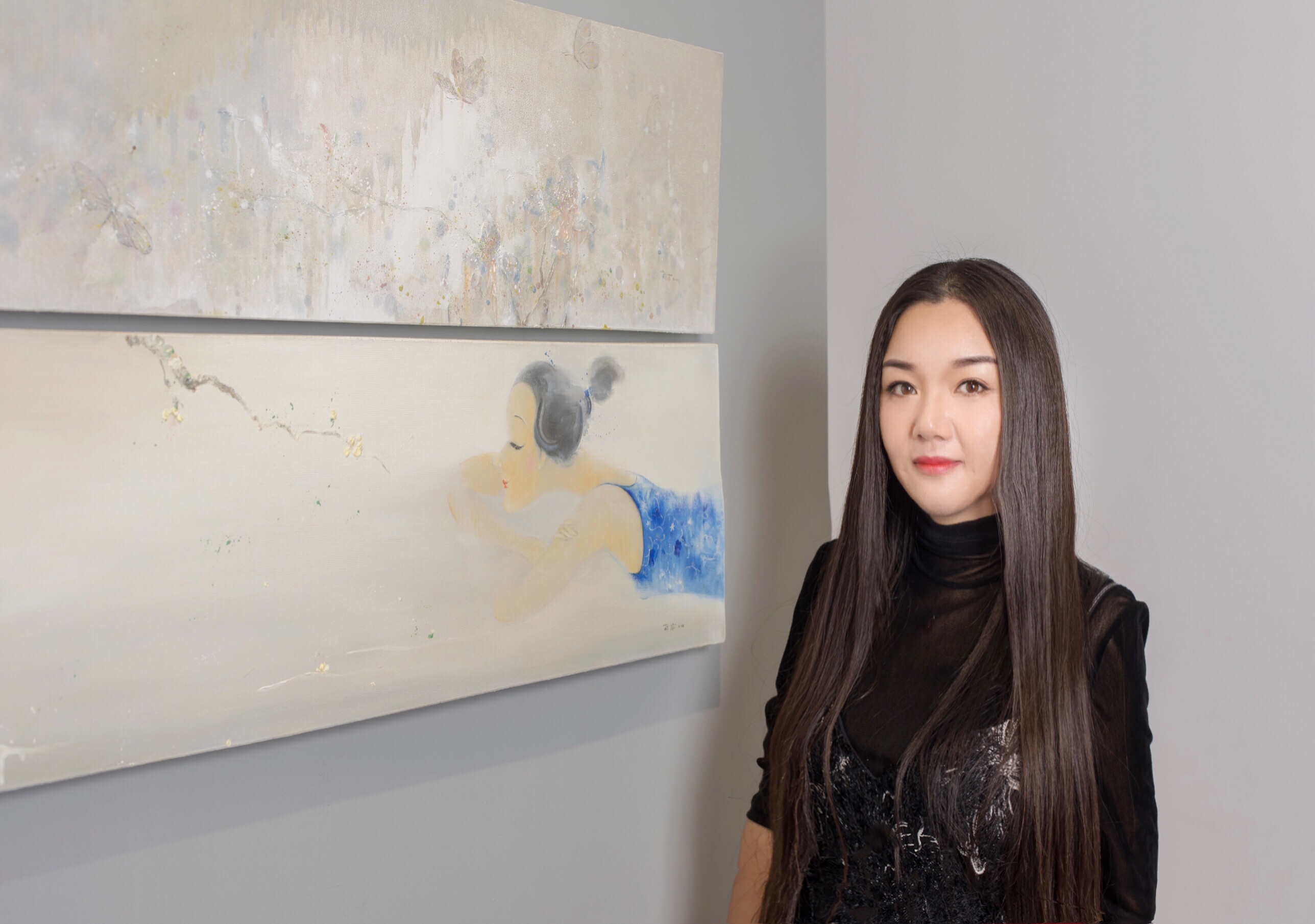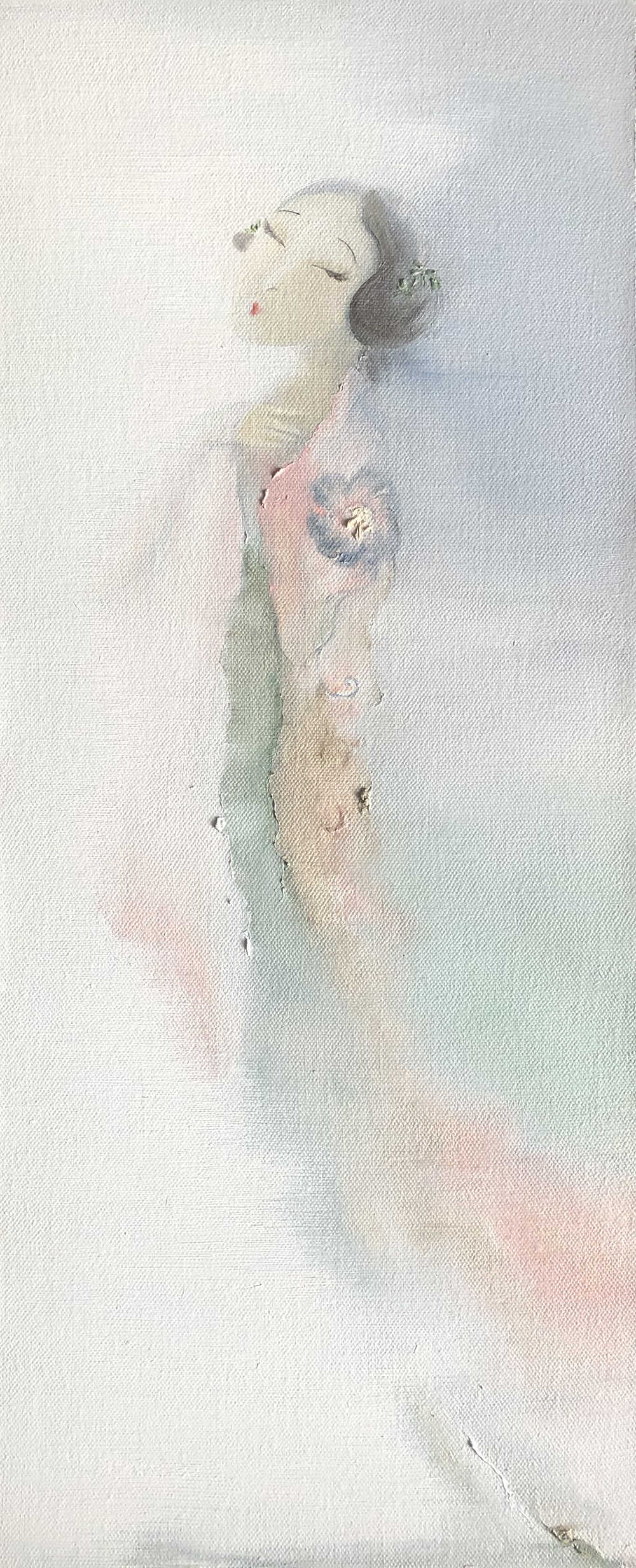2019 ”人生若萍” 郝萍个展专访 | INTERVIEW WITH HAO PING

1. 您来自于圣人孔子的故乡山东鲁国,这一特殊的人文背景与地理环境对您的艺术创作带来什么影响?
You are from ancient Lu Kindom in Shandong, where was the hometown of Sage Confucius. What influences does this special cultural background and geographical environment have on your creation?
郝萍:我生长在孔孟之乡的齐鲁大地,这里是中国儒家文化的发源地,黄河与泰山滋养着我的文化根脉。这里崇文尚礼,尊重先贤,“天人合一”的哲学思想渗透在我们的血液中。为我的油画创作提供了丰富的灵感。我的创作理念无不与自身的生活和文化背景息息相关。孔子故乡的厚土滋养了我的古典审美观,并以特有的艺术表达方式呈现给观者。
Hao Ping:I grew up in the land of ancient Qi and lu Kindoms, the hometown of Confucius, the birthplace of Confucian. The Yellow River and Mountain Tai nourish my cultural roots. The philosophy of “harmony between man and nature” permeates into my blood. It inspires me a lot on my art creation. My creative ideas are closely related to my life and cultural background. The rich soil of Confucius’ hometown nourishes my classical aesthetics and presents it to the audience in a unique artistic expression way.

2. 您的作品大多以西方油画的形式与技巧来表现中国水墨的晕染与线条,您觉得这样的艺术表现形式与传统水墨相比有何独特之处?
Most of your works use the form and technique of Western oil painting to express the halo and line of Chinese ink. What’s the difference between such art form and traditional ink?
郝萍:作为一名中国艺术家,我追求画的“意”和“神”。油画的可塑肌理感与传统水墨薄透的含蓄美感在某一个空间相遇,碰撞出一种和谐的呈现。这也是我在创作形式中对艺术语言的探索与思考,通过选择自己所熟悉的材质和媒介,更顺畅地去表达中国文人所特有的文化气质。东西方绘画语言的碰撞与融合,或许会产生出新的“化学反应”,给观者带来不同的审美体验和文化感悟。
Hao Ping:As a Chinese artist, I pursue the “meaning” and “spirit” of painting. The plastic texture of oil painting and the implicit beauty of traditional Chinese ink meet in a certain space, and collide to produce a harmonious presentation. This is also my exploration and thinking of artistic language in the form of creation. By choosing materials and media that I am familiar with, I can express the unique cultural temperament of Chinese literati more smoothly. The collision and fusion of the eastern and Western painting languages may produce a new “chemical reaction”, bringing different aesthetic experience and cultural perception to the audience.

3.您是如何想到要用夸张变形的五官来描绘中国的古代女子形象与特殊气质的?
How do you think of using exaggerated and deformed facial features to describe the image and special temperament of ancient Chinese women?
郝萍:中国美学追求镜花水月的美,如空中之音,水中之影。有时用写实的手法难以表达,所以我采用了夸张变形的方式来描绘中国古典女子婉约的仪态和含蓄内敛的美。我觉得这样能更好地表现这种超越时空的古典美以及与之相连的视觉幻像。这种似真似幻想的完美结合,创造了一个花非花的朦胧世界。
Hao Ping:Chinese aesthetics pursues the beauty of the mirror, such as the sound in the air and the shadow in the water. Sometimes it’s hard to express with realistic technique, so I use the way of exaggeration and deformation to describe the graceful manner and implicit beauty of Chinese classical women. I think it can better express the classical beauty beyond time and space and the visual illusion connected with it. This kind of perfect combination of plausible and fantasy creates a hazy world where flowers are not flowers.

4.本次展览的作品流露着自然和生命的气息,充满着禅意与“天人合一”的中国古代哲学思想,您希望通过这次展览向大家传达何种理念?
The works in this exhibition show the breath of nature and life, full of Zen inspiration as well as the ancient Chinese philosophy of “harmony between man and nature”. What kind of ideas do you hope to convey through this exhibition?
郝萍:自然和生命是这个世界最美的存在。庄子所说的"天地与我并生而万物与我为一",阐述的便是古人“天人合一”与万物和谐共存,和而不同的生活智慧与哲学理念,几千年来华夏文明也因此得以生存并延续至今。 因此我希望通过这次展览能够向世界传达这种理念、人观、自然观和世界观:人与自然,人与人、国与国,不同文化与宗教间也需要这种和谐共存,全世界和而不同,这样全人类才会有更美好的未来。
Hao ping:Nature and life are the most beautiful beings in the world. Zhuangzi said that “Heaven and Earth co-existence with me, and all things are one with me”. He expounded the ancient wisdom and philosophy of life that “Heaven and Human are one” and all things co-existence harmony, but not identically. For thousands of years, Chinese civilization has survived and continues to this day. Therefore, I hope this exhibition can convey to the world this idea, human view, natural view and world view: human and nature, human and human, country and country, different cultures and religions also need this kind of harmonious co-existence, and the world is harmonious but different, so that the whole mankind will have a better future.

5.您的许多人物作品取名于中国古诗词的词牌名,有什么特别的寓意吗?
Many of the titles of your characters and works are named after the tone titles of Chinese ancient poetry, are there any implied meanings?
郝萍:宋词创造了一个优美丰富的精神世界,它那独特的音节美、韵律美、意境美令我神之以往。我用词牌名为画取名,为了能将观者们带入宋词所营造的美学空间,给每一幅画一个较为直观的情感定位。词牌名更象一扇窗户,打开这扇窗,我们便能穿越时空与传统文化进行一次情感与审美上的对话。
Hao Ping:Song Ci has created a beautiful spiritual world, its special beauty of rythem, lyrics and conception make me interested in. I take the name of ancient tune titles to bring the viewers into the aesthetic art world created by the Song Ci and to give each painting a straight emotional position. The tune title is more like a window to the modern people. Open this window, we can have an emotional and aesthetic dialogue with traditional culture through time and space.

6.在日常生活中,您的生活状态是否也如您的作品所描绘的那样具有田园诗意般的洒脱与淡然呢?
In daily life, is your life state as free and easy as the pastoral poetry described in your works?
郝萍:每个人都不可能完全生活在自己的理想国中,我的生活状态亦如我的作品,努力突破内心的自我束缚,便可以享受田园诗意般的惬意。田园是人与自然的精神通道,独与天地精神往来,这是我理想的境界,更是我精神的追求。
Hao Ping:It is impossible for everyone to live in his own ideal country. My life state is just like my works. If I try to break through the inner self-restriction, I can enjoy the idyllic pleasure. Pastoral is the spiritual channel between human and nature, and the spiritual communication between heaven and earth alone, which is my ideal realm, and also my spiritual pursuit.
